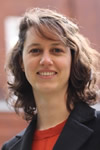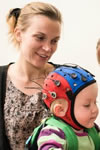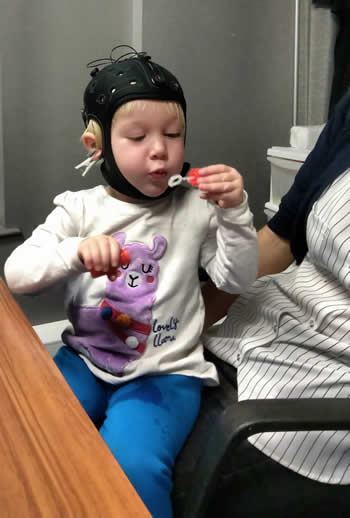In order to develop measures of children’s brain activity that can be used to test the impact of different environments, we first must develop a reliable way of measuring individual differences in how the infant brain works.
The Braintools project in the UK involves taking two measures of each child’s brain activity, approximately a week apart. We want to assess whether we get the same measure on the two different days. This will tell us whether the measures we are using are reliable measures of brain development, which can then be used with children in India and The Gambia.
Meet the Team UK

Rianne Haartsen
I am a Research Assistant at the Centre for Brain and Cognitive Development. My research interests are individual differences in early brain and cognitive development during infancy and toddlerhood. I recently finished my PhD in Psychology at Birkbeck, during which I examined communication between brain regions in infants who later received a diagnosis of autism. I am now continuing my work on early brain development by focusing on different brain activity measures in infants, toddlers, and children. My main responsibility on the Braintools project is to analyse the brain (EEG) data the team collects.

Ellie Braithwaite
I am a Research Assistant at the Centre for Brain and Cognitive Development (CBCD). I recently finished my Masters in Educational Neuroscience at UCL and Birkbeck universities, during which I looked at how infant brain function may indicate later cognitive ability. I am interested in early brain and cognitive development during infancy and toddlerhood, particularly that with a practical or applied element. I am part of the Braintools UK team, collecting data with infants and young children in the CBCD.

Paige Frankson
I’m a Psychology student from the University of Surrey currently on placement at the Birkbeck Babylab, and I’m particularly interested in Educational Psychology and Neurodevelopmental disorders in infants. My role in Braintools involves both scheduling visits for the children involved, and testing the children alongside Ellie and Teresa.

Teresa Del Bianco
I developed an interest for infant and child development during mu final internship at my master of Medicine (University of Pisa), where I studied emerging gastro-intestinal problems in children with Autism Spectrum Disorder. Subsequently, I started a PhD in Psychological Sciences and Education at the University of Trento, focusing on the perception of eyes and gaze-following in children and adults with typical and atypical development. After my dissertation in March 2018, I moved to London where I worked as a biostatistician and later joined the Centre of Brain and Cognitive Development at Birkbeck University. I am currently collaborating with multiple sites (South Africa, Spain, France) for implementing reliable EEG markers of infants and children neural processing of social and non-social information. With Braintools, I am currently contributing to the data collection and the data quality supervision.

Luke Mason
I am a developmental scientist interested in attention and multi sensory integration in developmental disorders, which I investigate using EEG, eye tracking and neuro-cognitive measures. On the Braintools project my main role is to develop an analysis pipeline for processing all of the data which is collected.

Emily Jones
I am a developmental scientist who is interested in understanding the mechanisms that shape individual differences. My work focuses on early brain development in infants who might be more likely to develop common neurodevelopmental disorders like autism and ADHD because of their family background, early environment or medical history. As part of this work, I am developing new tools to study brain development in diverse socio-economic settings. These tools could help us to map the risk factors that affect early brain development so that we can better target resources towards infants in need of extra support.
